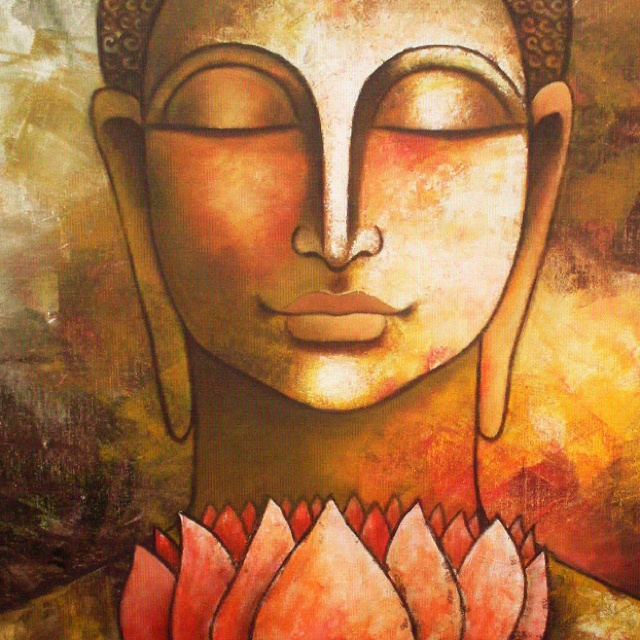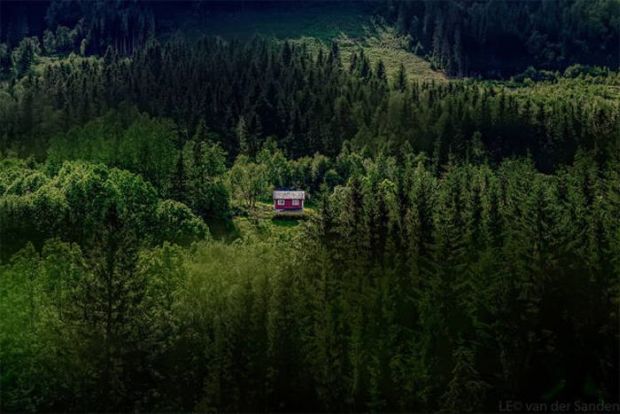Practice with Pleasure
Last night I listened to one of Sally Armstrong’s talks from the Concentration Retreat being held right now at Spirit Rock. The title of the talk is: Skillful Development of Pleasure in Practice and in Life, and it is one of the clearest, most non-jargon-y talks I’ve ever heard on the importance of the experience of pleasure in practice.
Not pleasure that is based on physical contact. But pleasure based on the mind’s ability to become collected and unified, which is a type of pleasure that is “felt” in the body, but which, frankly, is A WHOLE LOT BETTER! Hard to believe, I know, but it’s true.
At one point early in her practice, Sally experienced this kind of pleasure as “being like one of those long streams of sea-kelp, floating in an ocean of warm honey.”
At the time, she described this to her teacher, and expected to be told: “Just let it go. Don’t hold on to it. Don’t get attached.”
Instead, she was told: “Do more of that!”
Which she did!!!
***
This talk is a pleasure to listen to. You can find it on Dharmaseed here.
Still. Peaceful. Secluded.
OK, let me just say: the Eclipse was AWESOME!!!
I’m really glad I didn’t miss it. (I had been registered to attend a Concentration Retreat at Spirit Rock, Aug 14-24, but canceled when I found out the eclipse would be happening–right here in St. Louis–on Aug 21.)
I’m also glad that even though I had to miss the retreat, I don’t have to miss the talks from the retreat because many of them are already posted on Dharmaseed (here) — including the one I most wanted to hear, from Phillip Moffitt, on the deep states of concentration (known as jhana): From Directed Attention to Absorption.
Phillip talks about the feeling of “coming home” he experiences when the mind is still, peaceful, and secluded.
I know that feeling.
It, too, is “awesome”.
I Am Not Exempt
My apologies for not posting yesterday, but I was having surgery to remove a spot of skin cancer (not melanoma) that had returned. This was not an especially traumatic event, but it did give me pause.
Maybe that’s why last night I chose to listen to this talk by Joseph Goldstein titled: Deepening Insight into Permanence. It’s an excellent teaching on these 3 reflections:
Whatever is of the nature to grow old, will grow old. I am not exempt.
Whatever is of the nature to fall ill, will fall ill. I am not exempt.
Whatever is of the nature to die, will die. I am not exempt.
So As Not To Miss Out
While I was in Wisconsin helping my parents, several of my dharma friends were sitting the retreat at IMS that Akincano (along with Christina Feldman) taught right before the course on Vedana. So as not to miss out, while I was driving (for 12 hours!) from Wisconsin back to St. Louis, I listen to all the talks from that retreat on Dharmaseed (here).
There was lots of great stuff in those talks. But one tiny little thing (seemingly) that Christina said — almost as an aside — during the final 10 minutes of the last talk of the retreat, has really stuck with me, maybe more than anything else.
She said: “My intention this year — I often have a sort of overriding intention that I use as an investigation — is to have nobody in my life that I’m indifferent towards.
“I find this really startling, in terms of metta. I get on the train or I pass people on the street….or the person at the cash register in the supermarket, the person at the gas station, the people in the hotels who look after us, in the restaurants… It’s so easy to see people in terms of their functions, isn’t it. As if they’re somehow not really worthy of the attention we would give to someone we love, or someone we struggle with. I’ve found this quite a startling practice. Suddenly I seem to live in a much friendlier world!
“This is not about inflicting metta on people. [laugher] It’s not about ‘you’re going to get my metta whether you like it or not. Here it comes!’
“It’s about seeing. It’s about noticing. It’s about what happens in those moments when we offer a glance of tenderness and respect where our gaze falls. Whether we offer an acknowledgment. Whether we offer a smile.
“You know, I have so many subway journeys in London now where I feel like I’m surrounded by friends!“
***
I thought about what she said when I was a Walgreen’s yesterday. The whole place feels really tacky and aggressively “marketing-y” to me, so I tend to avoid eye contact with the cashier when I’m checking out (maybe because I’m embarrassed about shopping there, or embarrassed for them that they have to work there, or guilty maybe because they have to work there and I don’t?!?). But I remembered what Christina said and I looked up and made a point of thanking the cashier (who was really hustling to get me checked out) and it made a huge difference in how I felt. About the experience. About the woman who was working there. About the world, actually. And about myself.
I’m glad I didn’t miss out.
We Had a Language Before We Had Words
I’ve been listening again to talks by Ajahn Sucitto. I do this as often as I can. There’s a quality to what he says that touches me in a way that’s almost impossible for me to express. It’s not his style or his voice. (He has a pretty strong working-class English accent that’s sometimes hard to understand. He tends to mumble a bit. And sometimes it can seem like he’s just kind of rambling.)
But there’s something under his words… some authority…or authenticity…or some other “something”… that every so often just sort of grabs hold of me, really deep at the center, and my mind seems to STOP — almost as if it’s holding its breath so it can really LISTEN in some very deep, maybe even pre-verbal way.
When that happens, sometimes I just have to turn off the tape and be quiet for a while. And sometimes I have to keep going back over it, listening to it again and again. And then, usually, I feel compelled to write it down.
Which is what happened during the last 17 minutes of this talk: Establishing the Ground. Here’s what he said:
We had a language before we had words. A language of the heart. A language of presence. A language of authenticity before we had words…
In meditation we are listening behind the language for what’s being felt. How that’s affecting my mood, my energies, my nervous system. Is there anything in this where I get a sense of…uh huh, uh huh, uh huhhh. [Here he is making the sounds of someone who is listening to someone speak, following what they’re saying, and “getting it.”] That’s truth.
Then something shifts. You feel the shift. You feel the resonance of something, energy shifts and changes…from speedy to steady, from sluggish to awakening, from running around to stasis. There’s a shift.
There is is. That’s truth. You’ve just touched it. And you’ve touched it in your body. It can be difficult to really get that because we’ve lost some of the pathways into that. So sometimes there’s just flashes of it. We get intuitive resonances, where you suddenly feel more settled, more here. Clearer. Grounded.
This is the pathway into that embodied quality that we’ve lost access to. Truth reminds us where we are. Where we are is: here. It’s always present, open available, imperturbable.
Some senses, some intuitions, some things can cause the mind to return. Much of the Buddha’s teaching is a series of wonderful attempts and plays and structures to help that to occur. So it eventually becomes more than just an intuitive flash, but an increasingly strong sense of presence. When you walk, when you sit, when you listen.
Even when you speak.
So much so that it’s said that “the sage, even when they speak, they’re silent.”
Because the speaking is coming from the silence of their presence….
Have you walked in open country? Open country is the openness of your own mind.
***
Click here to listen to the talk.
Getting our Mind around Mindfulness
The word “mindfulness” gets tossed around a lot these day, but nobody seems to be clear on what the “mind” actually is. So I really like Ajahn Sucitto’s reflections on this in his recent talk, Mindfulness and Experiencing a Living Being. (Which is described by whoever put the talk on line as: “A truly excellent exploration of mindfulness, what it’s about, and how to get our minds around it.”)
Sucitto says:
“Mindfulness…sati [in Pali]…is the particular quality of mind that causes one to remember, causes a certain deepening, and then ‘uh-hu’…a kind of recognition… That’s the etymology of it. So, mindfulness is that which causes you to have an ‘un-hu’ moment. Where something is happening that lands, is referred to, and is felt. It touches, really touches the citta [mind-heart]. So the citta receives it. Gets a handle on it. Gets a feel for it…
“Mindfulness is not thoughtfulness, though thoughtfulness plays a part in it. It’s not attention, though attention has a part. It’s not fixed concentration.
“It’s: Mindfulness.
It’s bringing something to mind.
“So, what is ‘mind’?
“For many people ‘mind’ would seem to be the rational processes. That’s part of it. But that’s what Buddhists call ‘inner speech’.
The mind is something more like ‘heart’. It has emotion, but it’s a bit more than that. It has thought. It has intuition…imagination. It has sensitivity. It has stillness…presence.
“There is a gradation of qualities that we can experience, which would be held under the term ‘mind’. Including the kind of experiences that are not common to the everyday person — a sense of just: open, aware, with no thought — but very aware. For many people this is not a reference.
“But that’s ‘mind’. In fact, in Buddhist understanding, that’s the clearest, most accurate description of mind: sensitive, open, with no particular content — but able to handle content, if content arises. That would be considered to be the optimal ‘mind’.
***
I don’t know about you, but this blows my mind. (And that’s just the first five minutes of the talk!) Click here to listen to it all.
Meditation is Enjoyment
 Last night I listened to yet another great talk by Ajahn Sucitto (from the retreat last month at IMS). Apparently someone must have complained about not getting specific enough instructions from him about “how to meditate” — particularly it seems about how to get into the deep absorption states called “jhana.” The whole talk is great, but my favorite part is the last ten minutes:
Last night I listened to yet another great talk by Ajahn Sucitto (from the retreat last month at IMS). Apparently someone must have complained about not getting specific enough instructions from him about “how to meditate” — particularly it seems about how to get into the deep absorption states called “jhana.” The whole talk is great, but my favorite part is the last ten minutes:
“The Buddha said that when your body is refreshed and relaxed, there’s no need to make a special effort to make your mind feel happy. IT FEELS HAPPY. And when your mind is happy, there’s no need to make a special effort to concentrate. IT IS CONCENTRATED. It is ‘samadhi-ed.’
“Meditation is enjoyment. If it isn’t, then it isn’t meditation. Or, it hasn’t arrived yet. Sure, it’s not always easy. But you don’t always have to have it easy as long as it’s meaningful, and it’s not punitive, and it’s not crushing you. Or if it is, well, we can work that out. And even that’s got some quality of enjoyment and energy and faith and interest.
“Clearing the heart. Dwelling in the body. That’s the absorptive process.”
***
Click here to listen to the whole talk.
Sacred Play
 I’ve been listening to the talks Ajahn Sucitto gave at IMS last month. I always try to jot down a few of his more evocative phrases, but quite often I find that I’m transcribing the whole talk!
I’ve been listening to the talks Ajahn Sucitto gave at IMS last month. I always try to jot down a few of his more evocative phrases, but quite often I find that I’m transcribing the whole talk!
Here’s a sample from a short reflection he gave on April 10, after the morning ritual (puja) of chants, bows, and making offerings:
This is sacred play. It’s play not in the foolish sense, but play as in the acts that we do that are purely in the moment, using just what we have. It’s not: “Well, I’ll do this and then in four days time I’ll get it done.” That’s what we call work. [laugh]
But this is play. It’s: What counts is just right now and…let it go, let it go. Just now, let it go. There’s no competition, there’s no: Who did better than anybody else? It’s just what it is.
This is where, in this mind of play, that our body is most vital, alert, less anxious, less worried, less forceful, less faltering, less doubtful. This is how our body actually is.
We’ve kind of gotten used to tuning into machines and systems and times that are not what the body is. This play is just tuning into the organic life, the momentary nature of it. This is where the body is just what it is and it doesn’t aim for results. It’s not pushy and it’s not faltering. The body is in “true.” And in “true,” we find truth.
Truth is: There is this which is in us that is not the proscribed, historical identity. There is this within us that is not “what I am, what I was, what I should be, what I could be, what will other people think of me…”
There is this. And “this” is the real heart and vitality. There is a precious alignment of consciousness. The more we align ourselves with this and enact it…the more this alignment can remain a little longer, a little more recognized on a conscious level: “I don’t have to be who I’m supposed to be. Or who I think I am. I can just be this life…as it happens…beautifully.”
This is faith. This is “sadha,” the Buddha’s word that is translated as faith or confidence. We can have faith or confidence in all kinds of “things”…and they will be causes of dispute and attachment. And dogmatism. And all that.
But this is faith in the purity of consciousness as it’s manifesting right now. Very intimate. Immediate. Not delayed in time. Inviting you to enter that domain, revealed within yourself, revealed through wise handling.
This alignment then, when the silence enters, when the voice sounds have finished their play…perhaps this can be a little fresher, a little more innocent, less anxious, a little less pushy, or less hanging back.
This is mediation.
***
I have edited the above for clarity. Click here to listen to the full talk.
We Know How to Steer
Another one of my favorite talks from the 2-month retreat is this one, by Guy Armstrong (especially the last 20 minutes or so), in which he talks about how we are bound to our past actions by the way we are shaped by them; we are conditioned by the patterns of thought, speech and action that we have invested in over and over again.
“These patterns are strong, but the beautiful thing is: they’re not fixed. Nothing in our being is fixed. Not the patterns. Not craving. Not even ignorance…. These are all still just arising and changing. Anything that has arisen can also pass away. Any patterning that has been established can be undone. This is the karmic principle that makes dharma practice transformative…
“The path itself is a karmic unfolding. We start with the conditioned habits of mind that we bring into practice from perhaps lifetimes of craving, ignorance, and so forth. But as we encounter the dharma we start to bring in wholesome mind states — mindfulness, lovingkindness, renunciation, tranquility, concentration, equanimity — and all these start to change us, little by little by little… All these new karmic effects start to steer the stream [of our mind] in a different direction…from suffering (samsara) to the end of suffering (nibbana). That is the only place this leads.
“And it’s important to know this because, as Yogi Berra says: ‘If you don’t know where you’re going, you could end up somewhere else.’ So we want to know where we’re going: We want to end up in nibbana. If there were anything fixed in us, then these streams of dharma practice couldn’t change us; they couldn’t turn us in that other direction.
“So that’s why the teaching on not-self — meaning there is nothing fixed at the center — is the avenue by which karma can unfold in us and we can change the patterning of our actions…
“Our situation is — all of us — we are afloat on a sea of changing conditions. Most of them are outside our control. External things — the weather, to some extent our body, the interactions we have with people, the successes or disappointments we have in life — a lot of these are really beyond our control.
“But we have one really important thing: We have a rudder and we know how to steer. And the rudder for our journey on this unpredictable, uncontrollable ocean — is karma.
“We steer through the force of our wholesome intentions. And the Buddha said that those intentions, repeated over and over again, are what take us to a safe harbor. Of peace. Of safety. Of security. Of release. And of liberation.”
Live in the Layers
Another one of the talks from the retreat that I’ve been re-listening to (and will probably listen to again and again) is this one by Phillip Moffitt, mostly dealing with the topic of “not-self” (anatta), which as Phillip says, is one of those understandings that are non-conceptual, that have to come to us through direct experience, that for a long time just don’t make any sense because it’s something “we just don’t know — until we do.”
So it’s one of the teachings that we have to talk about by talking around. Which is where poetry comes in. Here’s the poem Phillip quotes, by Poet Laureate Stantley Kunitz, who wrote it when he was 89:
The Layers
by Stanley Kunitz
I have walked through many lives,
some of them my own,
and I am not who I was,
though some principle of being
abides, from which I struggle
not to stray.
When I look behind,
as I am compelled to look
before I can gather strength
to proceed on my journey,
I see the milestones dwindling
toward the horizon
and the slow fires trailing
from the abandoned camp-sites,
over which scavenger angles
wheel on heavy wings.
Oh, I have made myself a tribe
out of my true affections,
and my tribe is scattered!
How shall the heart be reconciled
to it’s feast of losses?
In a rising wind
the manic dust of my friends,
those who fell along the way,
bitterly stings my face.
Yet I turn, I turn,
exulting somewhat,
with my will intact to go
wherever I need to go,
and every stone on the road
precious to me.
In the darkest night,
when the moon was covered
and I roamed through wreckage,
a nimbus-clouded voice
directed me:
“Live in the layers,
not on the litter.”
Though I lack the art
to decipher it,
no doubt the next chapter
in my book of transformations
is already written.
I am not done with my changes.








